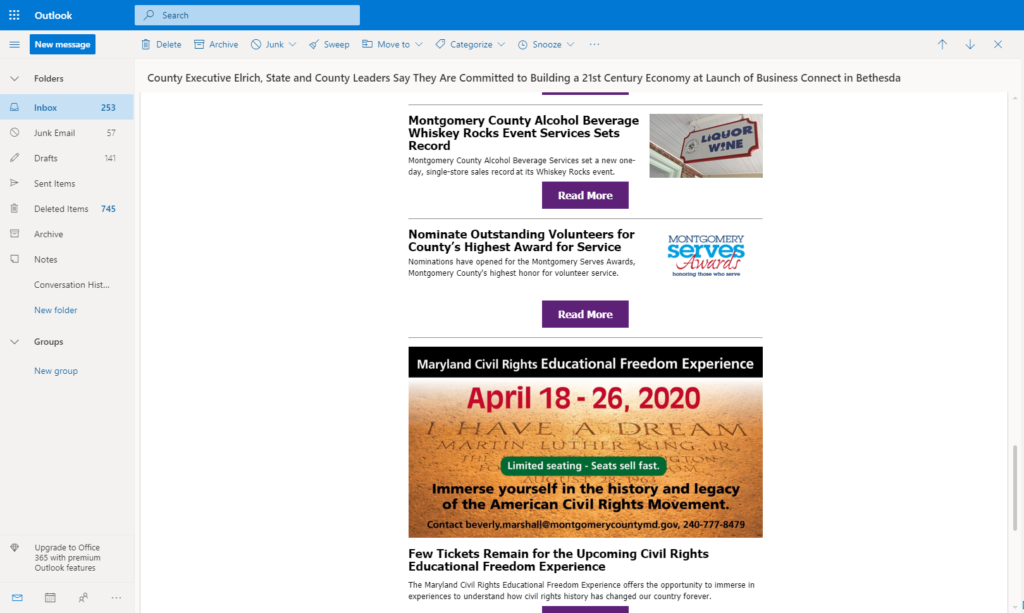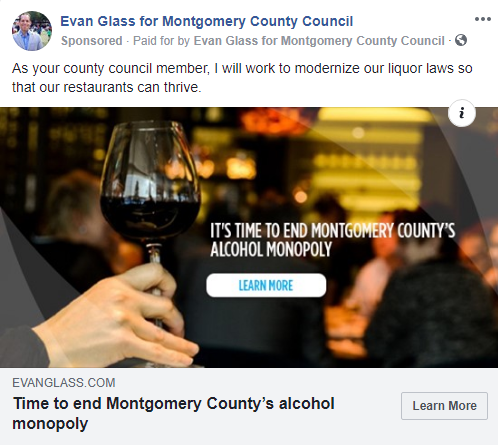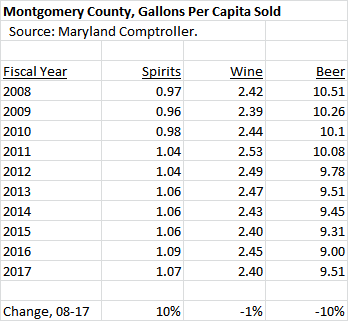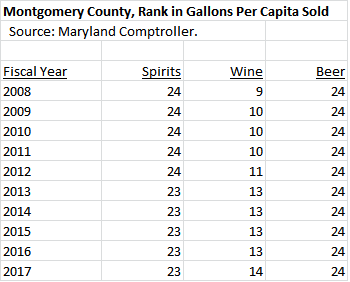By Adam Pagnucco.
Montgomery County Executive Marc Elrich has announced that he is “focused on building a 21st century economy that will help the County maintain its leadership position in the State, while being more competitive in the Washington D.C. metropolitan region.” And how will that be done?
By marketing the county’s 1930s-era soviet liquor monopoly, of course!
The county’s Alcohol Beverage Services (ABS), formerly known as the Department of Liquor Control, has a monopoly on wholesale distribution of alcohol from which only small, local craft breweries and distilleries are exempt. Through its county liquor stores, ABS also has a monopoly on off-premises retail sales of spirits. This structure has been in place since the end of prohibition.
The original purpose of the liquor monopoly was to “control certain obnoxious practices” and “keep the county an attractive place to live.” Now, however, the purpose of the monopoly is to make money. During the current fiscal year, ABS is projected to contribute $28 million to the general fund and an additional $9 million to pay off county debt service. Despite its overall profitability, ABS is under heavy pressure to make even more money for four primary reasons.
First, the county projected a $100 million revenue shortfall back in December. It’s unknown whether that number will change when the executive’s recommended budget is released next month, but if there is a shortfall of close to that amount, that’s a problem.
Second, the county has been raiding its retiree health care fund to balance its budget in recent years. A statement by Wall Street credit agency Moody’s warned the county to stop doing that. If the county takes heed, how will it replace that money?
Third, the county council clearly has no appetite for tax increases at the moment.
Fourth, Council Member Hans Riemer recently revealed that the county liquor stores as a group are actually losing money, not making it. That prompted an explosive reaction from ABS Director Bob Dorfman amid questions about whether the stores should continue operations.

An excerpt from an email by the county executive calling for a 21st Century economy and simultaneously promoting the liquor monopoly.
ABS has now proposed a solution for increasing the stores’ profitability: it wants to rebrand them. In a council session on February 20, the council reviewed a letter from the county attorney asking for permission to hire outside counsel specializing in trademarks to secure a new name. The county’s chief administrative officer told the council that the specific name being considered is “Cork and Barrel,” which a simple Google search confirms is widely used around the country (including in Maryland). The initial outlay to the trademark attorney is expected to be less than $6,000. But if ABS does go through with a name change, there will be many additional expenses for logo design and changes to facilities and equipment. Last summer, when water and sewer utility WSSC proposed a name change, the projected expenses totaled $850,000. Council Member Evan Glass raised the experience of WSSC and said, “If a government monopoly or a quasi-government monopoly needs a marketing and outreach strategy then there is a problem.”
Three council members – Riemer, Glass and Andrew Friedson – voted against the appointment of counsel. Friedson and Glass have gone on record in opposition to the liquor monopoly. Riemer thinks it is time for the county to close its retail liquor stores. The rest of the council voted in favor of hiring outside counsel.
The county council has almost no power to control the liquor monopoly under state law. But the General Assembly does and its vision for the monopoly is very different from the Elrich administration’s. In 2017, the General Assembly passed a state law enabling the monopoly to contract with private stores to allow them to sell spirits. (Right now, only county liquor stores may sell hard alcohol – a crucial advantage for the county.) But ABS has ignored the law’s intent and has so far refused to allow private retail sales of spirits. Its rationale is understandable: without its retail spirits monopoly, its stores might never be profitable. No dissenting votes were cast in Annapolis against the law that the monopoly now flouts. Will MoCo’s state legislators hold it accountable?
As for the name change and marketing expenses, consider this. State law requires private beer and wine stores to purchase products from the county liquor monopoly’s wholesale operation. Their payments will now be used to rebrand and market the county liquor stores that are in direct competition with them. In essence, they will be required to pay for the county’s attempt to raid their market share and take away their business.
How is this a legitimate function of government?
How can Montgomery County do this and claim that it is business friendly??
MoCo faces a choice. It can move into the 21st Century and allow competition. Or it can have a 1930s-era soviet liquor monopoly.
It can’t do both.








